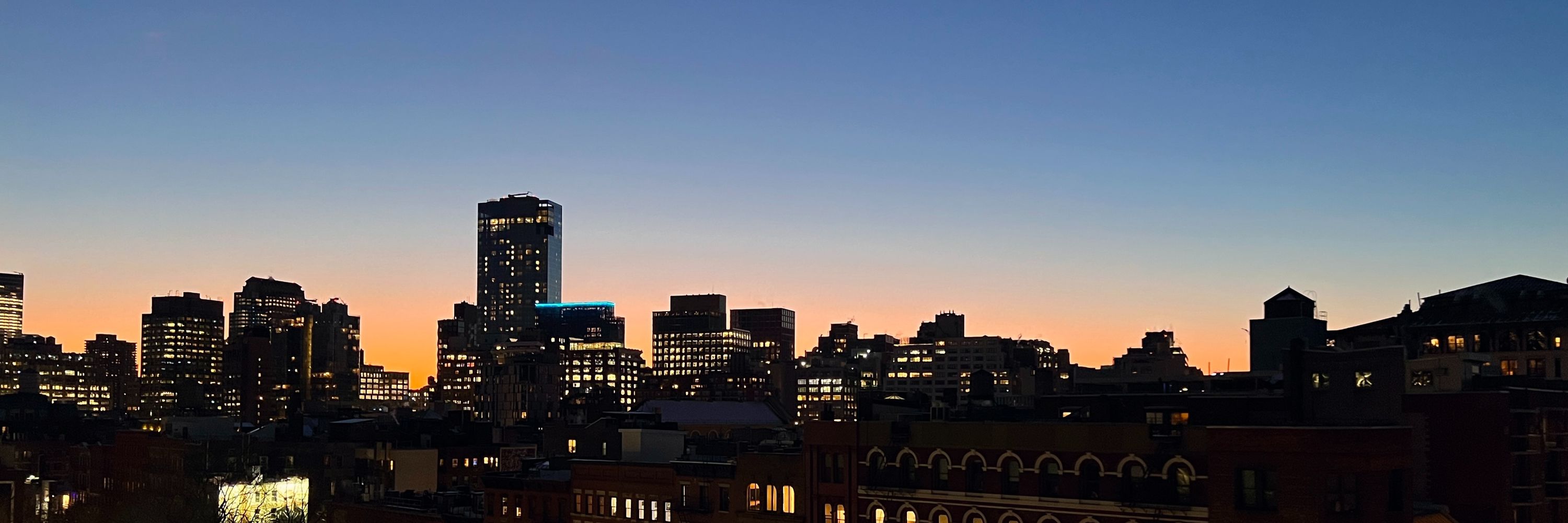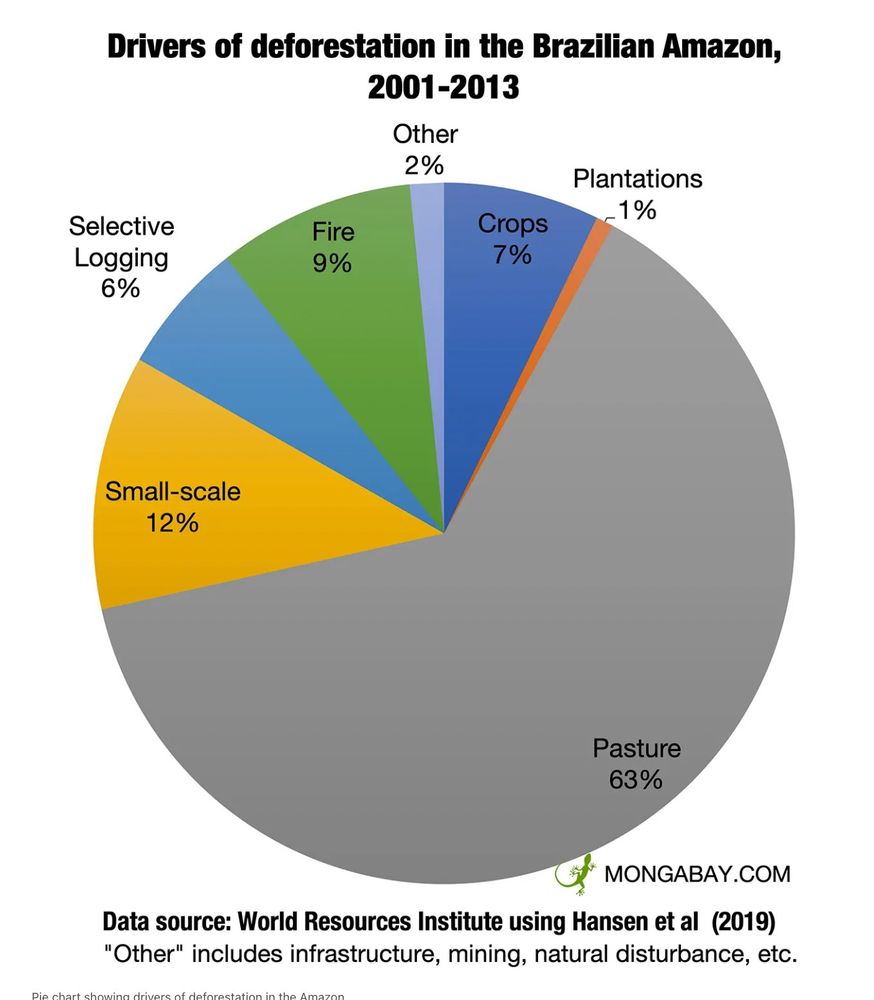
Matthew Hayek
@matthewhayek.bsky.social
NYU Asst. Professor of Environmental Studies. Climate, animals, land use, and food systems. MatthewHayek.com
In the next graf, he says cheese puffs are proof that processing itself is unhealthy. But cheese puffs are a refined grain, something that dietary guidelines have recommended we substitute for whole grains since the early 00s. And what is 'highly processed starch'? Seems like it's just...starch. 4/

November 10, 2025 at 8:17 PM
In the next graf, he says cheese puffs are proof that processing itself is unhealthy. But cheese puffs are a refined grain, something that dietary guidelines have recommended we substitute for whole grains since the early 00s. And what is 'highly processed starch'? Seems like it's just...starch. 4/
The main voice for "it's the processing, dummy" is Dariush Mozzafarian at Tufts. He argues that we've altered the physical and molecular structure of foods. But that's the naturalist fallacy dressed up on more scientific-sounding clothes. It seems paper-thin and easy to refute. 2/

November 10, 2025 at 8:17 PM
The main voice for "it's the processing, dummy" is Dariush Mozzafarian at Tufts. He argues that we've altered the physical and molecular structure of foods. But that's the naturalist fallacy dressed up on more scientific-sounding clothes. It seems paper-thin and easy to refute. 2/
This also drives the news writers to reach a dubious conclusion that producers can readily drive down impacts: if regional variation is so great, just source lower-emissions beef or emulate those methods, right? This is NOT a readily available mitigation measure though.

October 21, 2025 at 5:46 PM
This also drives the news writers to reach a dubious conclusion that producers can readily drive down impacts: if regional variation is so great, just source lower-emissions beef or emulate those methods, right? This is NOT a readily available mitigation measure though.
Their simplified model assumptions cause the model to incorrectly flood groceries & restaurants in Chicago with culled dairy beef, while in Omaha they're full of marbled steaks & other cuts from angus steers, driving stark difference in emissions seen in their figure below, which are fictitious

October 21, 2025 at 5:46 PM
Their simplified model assumptions cause the model to incorrectly flood groceries & restaurants in Chicago with culled dairy beef, while in Omaha they're full of marbled steaks & other cuts from angus steers, driving stark difference in emissions seen in their figure below, which are fictitious
Also, while they say they include feedlots, their supply chain example looks at NYC metro area, in which feedlots are completely missing. Realistically, many of these cattle were shipped to the midwest, then back to NYC for steakhouses, and premium beef products at grocers.

October 21, 2025 at 5:46 PM
Also, while they say they include feedlots, their supply chain example looks at NYC metro area, in which feedlots are completely missing. Realistically, many of these cattle were shipped to the midwest, then back to NYC for steakhouses, and premium beef products at grocers.
They claim that Chicago & Wisconsin get most of their beef from nearby dairies. But that's immediately suspicious. There are steakhouses in those areas! There are plenty restaurants that pride themselves on serving angus, which like >70% of US beef, must be coming from feedlots.

October 21, 2025 at 5:46 PM
They claim that Chicago & Wisconsin get most of their beef from nearby dairies. But that's immediately suspicious. There are steakhouses in those areas! There are plenty restaurants that pride themselves on serving angus, which like >70% of US beef, must be coming from feedlots.
In their 2050 scenarios, they recommend 46% more fish production/catch than 2020. But populations are only expected to rise by 21%, and per capita consumption isn't recommended to be any higher than it is today. See Fig 7. WHY?

October 9, 2025 at 7:41 PM
In their 2050 scenarios, they recommend 46% more fish production/catch than 2020. But populations are only expected to rise by 21%, and per capita consumption isn't recommended to be any higher than it is today. See Fig 7. WHY?
The diet hasn't changed much from 2019, in that per-capita seafood consumption globally is about where it should be. It's now recommended that, on a global average, people eat a bit less. BUT...

October 9, 2025 at 7:41 PM
The diet hasn't changed much from 2019, in that per-capita seafood consumption globally is about where it should be. It's now recommended that, on a global average, people eat a bit less. BUT...
The new Planetary Health Diet has been released by the EAT-Lancet commissions. Despite hearing years of talk about major methodological changes, the new recommendations look...basically the same as first one! Image from the Guardian. Links below

October 3, 2025 at 5:32 PM
The new Planetary Health Diet has been released by the EAT-Lancet commissions. Despite hearing years of talk about major methodological changes, the new recommendations look...basically the same as first one! Image from the Guardian. Links below
All of this pseudoscience helps justify the same pro-subsidy, anti-regulation positions that have driven rural US politics that placate the largest producers for decades 6/

July 16, 2025 at 6:28 PM
All of this pseudoscience helps justify the same pro-subsidy, anti-regulation positions that have driven rural US politics that placate the largest producers for decades 6/
There's also the oft-repeated claim that our soils are going to disappear in a few decades. That's not true either; it's an telephone myth originating from a UN speech with no citations. It's been thoroughly debunked 5/ ourworldindata.org/soil-lifespans

July 16, 2025 at 6:28 PM
There's also the oft-repeated claim that our soils are going to disappear in a few decades. That's not true either; it's an telephone myth originating from a UN speech with no citations. It's been thoroughly debunked 5/ ourworldindata.org/soil-lifespans
The BS claims mentioned here include claiming that healthy soils are vital for nutrition. Sure depleted soils can reduce yields, but nutrients in our food aren't getting any lower bc of soil nutrients. The strength of their language reflects the latter though. 3/

July 16, 2025 at 6:28 PM
The BS claims mentioned here include claiming that healthy soils are vital for nutrition. Sure depleted soils can reduce yields, but nutrients in our food aren't getting any lower bc of soil nutrients. The strength of their language reflects the latter though. 3/
At @drkatemarvel.bsky.social‘s book talk at NYPL “Earth is the best planet. All these billionaires want to go to Mars but they won’t even move to Jersey.”


June 17, 2025 at 2:24 AM
At @drkatemarvel.bsky.social‘s book talk at NYPL “Earth is the best planet. All these billionaires want to go to Mars but they won’t even move to Jersey.”
🎉 Thrilled to announce I've been granted tenure and promoted to Associate Professor at NYU Environmental Studies this fall! This wouldn't have been possible without my generous professional network—both in & beyond academia—and especially the immense unwavering support from my department. Thank you!

June 5, 2025 at 3:17 PM
🎉 Thrilled to announce I've been granted tenure and promoted to Associate Professor at NYU Environmental Studies this fall! This wouldn't have been possible without my generous professional network—both in & beyond academia—and especially the immense unwavering support from my department. Thank you!
A recent study found no differences in muscle synthesis between eating a complete animal protein (lean beef) vs incomplete plant protein (e.g. only black beans). This is *despite* funding from the beef industry. doi.org/10.1016/j.tj...

April 8, 2025 at 6:50 PM
A recent study found no differences in muscle synthesis between eating a complete animal protein (lean beef) vs incomplete plant protein (e.g. only black beans). This is *despite* funding from the beef industry. doi.org/10.1016/j.tj...
Gorse is also a nitrogen-fixing fabacae (legume family) bush, which is what makes it so special as a hedge in British & Irish agriculture. It harbors nitrogen-fixing microbes in root nodules, recuperating soil nutrients and texture.

March 21, 2025 at 7:19 PM
Gorse is also a nitrogen-fixing fabacae (legume family) bush, which is what makes it so special as a hedge in British & Irish agriculture. It harbors nitrogen-fixing microbes in root nodules, recuperating soil nutrients and texture.
But as the land stewards explain, early successional species, including invasive gorse, are like the hare, whereas native trees are the tortoise. Gorse sprints & crowds out sun, but tree seedlings can survive in low light (slow & steady), eventually crowd gorse & grow a canopy that suffocates it.



March 21, 2025 at 7:10 PM
But as the land stewards explain, early successional species, including invasive gorse, are like the hare, whereas native trees are the tortoise. Gorse sprints & crowds out sun, but tree seedlings can survive in low light (slow & steady), eventually crowd gorse & grow a canopy that suffocates it.
And Hinewai is covered in an aggressive invasive species: the yellow flowering gorse bush, from the British isles. In fact, the conservation center is completely surrounded by it


March 21, 2025 at 7:04 PM
And Hinewai is covered in an aggressive invasive species: the yellow flowering gorse bush, from the British isles. In fact, the conservation center is completely surrounded by it
Compare to Jigsaw Farms, touted by its owners & media as a paragon of incorporating trees into livestock grazing (~9x zoom of above image of Hinewai). It's mostly just open field. Meanwhile, this farm has already absorbed the maximum carbon that it can hold. www.theguardian.com/australia-ne...

March 21, 2025 at 6:53 PM
Compare to Jigsaw Farms, touted by its owners & media as a paragon of incorporating trees into livestock grazing (~9x zoom of above image of Hinewai). It's mostly just open field. Meanwhile, this farm has already absorbed the maximum carbon that it can hold. www.theguardian.com/australia-ne...
Here's a google earth view of the southeastern end of Hinewai Reserve. Can you trace where the fence is between the reserve on one side and grazing sheep are on the other?

March 21, 2025 at 6:46 PM
Here's a google earth view of the southeastern end of Hinewai Reserve. Can you trace where the fence is between the reserve on one side and grazing sheep are on the other?
One day late for 'World Rewilding Day', I'd love to share and discuss this incredible example of rewilding a corner of New Zealand--the Hinewai Reserve on the Banks Peninsula near Christchurch. It exemplifies so much of what can go right with rewilding and upends conventional conservation wisdom 🧵

March 21, 2025 at 6:02 PM
One day late for 'World Rewilding Day', I'd love to share and discuss this incredible example of rewilding a corner of New Zealand--the Hinewai Reserve on the Banks Peninsula near Christchurch. It exemplifies so much of what can go right with rewilding and upends conventional conservation wisdom 🧵
Cattle pasture is the largest driver of Brazilian Amazon deforestation by a dramatic majority. All urban infrastructure, power transmission, mining, and more combined contributes 2%.

March 12, 2025 at 3:03 PM
Cattle pasture is the largest driver of Brazilian Amazon deforestation by a dramatic majority. All urban infrastructure, power transmission, mining, and more combined contributes 2%.
Come see me this documentary at @harvardchanschool.bsky.social. I'll be discussing our recent analysis of capture and trade of wild fish to feed the booming aquaculture industry hsph.harvard.edu/environmenta...

February 5, 2025 at 5:09 PM
Come see me this documentary at @harvardchanschool.bsky.social. I'll be discussing our recent analysis of capture and trade of wild fish to feed the booming aquaculture industry hsph.harvard.edu/environmenta...
At the same time, it matters what plant-based meats are replacing. The authors note there is probably not a slight health benefit when it compares to eating whole beans.

February 4, 2025 at 5:18 PM
At the same time, it matters what plant-based meats are replacing. The authors note there is probably not a slight health benefit when it compares to eating whole beans.


